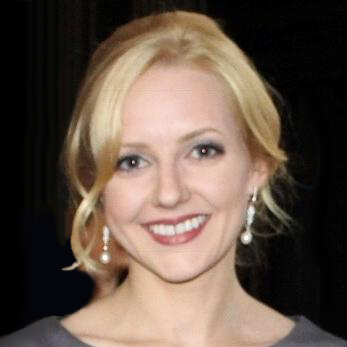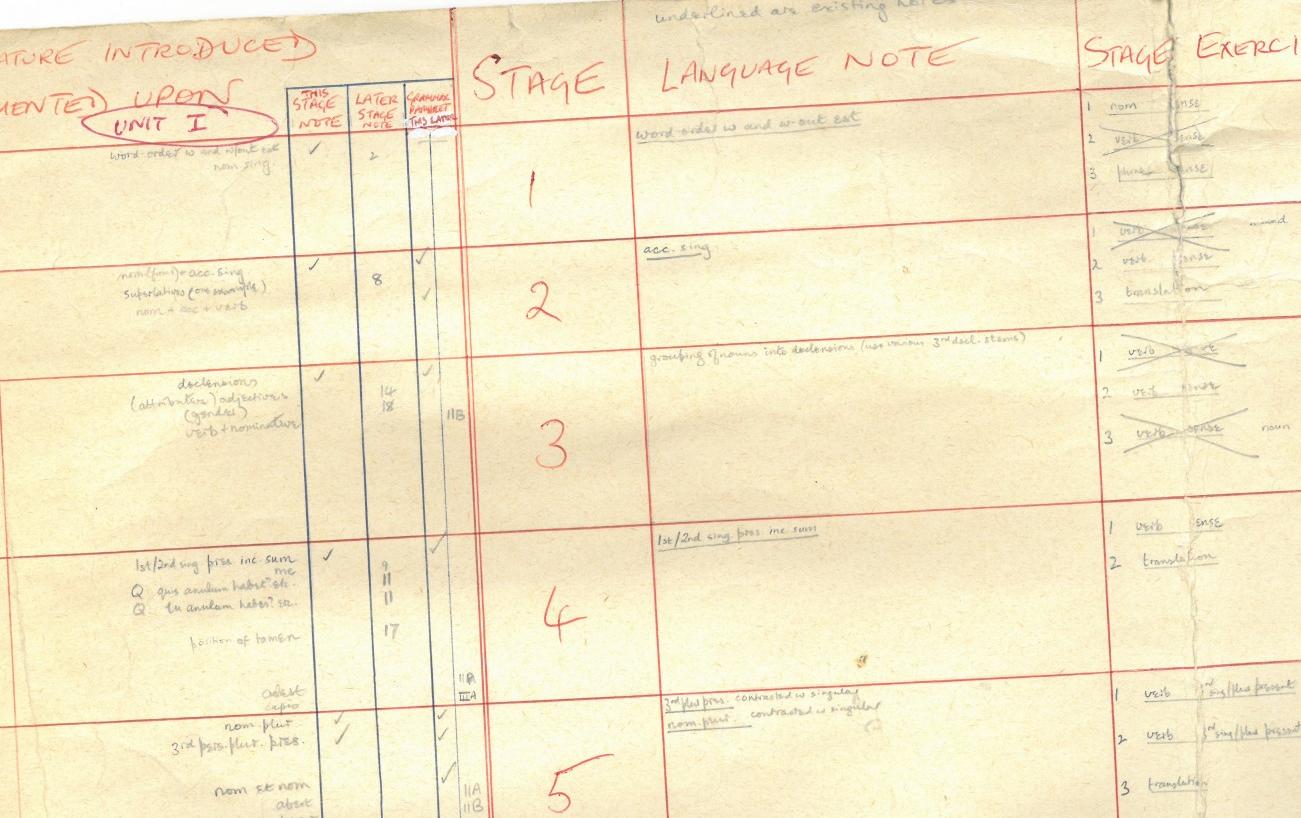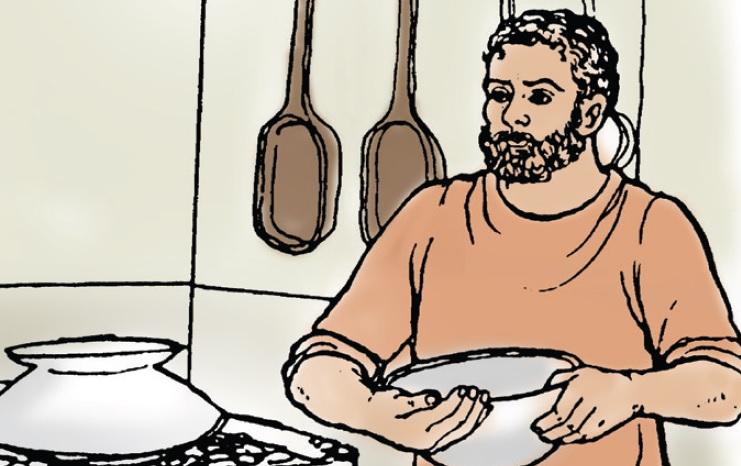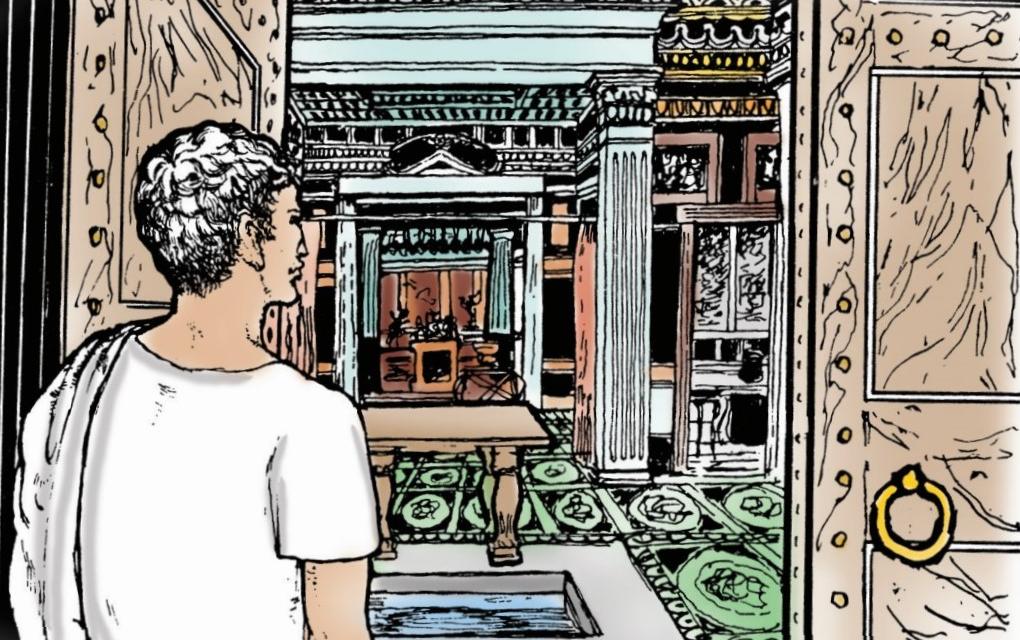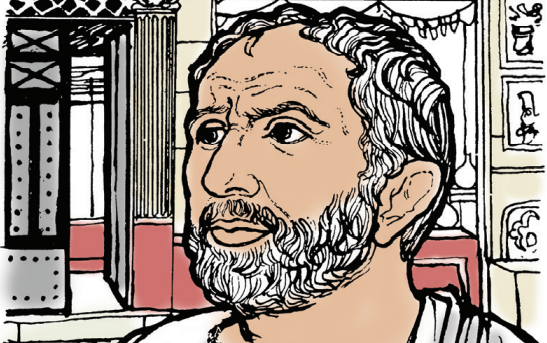If you’ve ever used the Cambridge Latin Course eLearning DVD, chances are the faces of Tim Clark, Clare-Marie Roxby and Ed Noy-Scott are familiar. Better known as Caecilius, Metella and Grumio, they were teaching at the Royal Grammar School in Newcastle in the early 2000s when the ancillary videos were made. CSCP’s Caroline Musgrove spoke with them about their rise to CLC stardom.
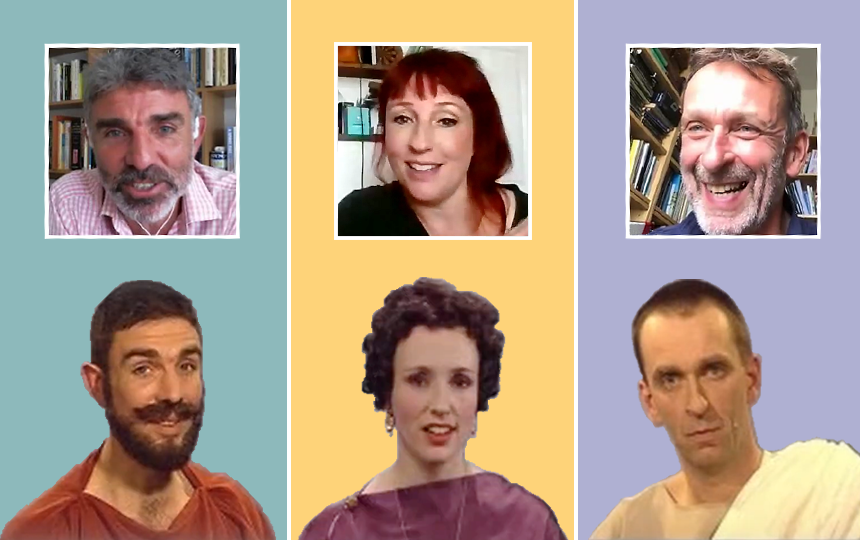
Submitted by Anonymous on Tue, 26/04/2022 - 13:28
Ed Noy-Scott as Grumio, Clare-Marie Roxby as Metella and Tim Clark as Caecilius in stills from the eLearning DVD, alongside pictures of the cast from our Zoom call in 2021.
In the early 2000s, the eLearning DVD introduced the Cambridge Latin Course to a new audience of students and revolutionised how the subject was taught. Financed by the Department for Education and Granada Media, the DVD contained hours of audio and video footage, language explanations and documentary material. It also featured some now-familiar faces in the leading roles: Tim Clark as Caecilius, Clare-Marie Roxby as Metella and Ed Noy-Scott as the ever-popular Grumio.
But how did the cast get involved? In the summer of 2021, I spoke with them to find out.
“CSCP were looking for actors initially,” Clare-Marie explained. “But they struggled to find professional actors who could pronounce the Latin properly."
They struggled to find professional actors who could pronounce the Latin properly.
Clare-Marie Roxby
The Project changed tack and began searching for Latin teachers with acting experience. Peter Jones, then Professor of Greek at Newcastle University, was tasked with finding likely candidates. “He knew I had acted,” Tim says, “or attempted to, so he called me, and I suggested he contact Ed and Clare.”
At the time, all three were teaching Classics at the Royal Grammar School (RGS) in Newcastle. Tim is an ancient historian by training. He completed his PGCE at Cambridge under Pat Story, who later became CSCP’s Director. Ed trained as a Classicist, finishing a PGCE at Cambridge in 1993. Clare-Marie studied Ancient Greek, Latin and French at Newcastle University before taking up her teaching post at the RGS. She had a background in classical singing and had starred in several college plays.
Melissa and Clemens, the cast recall, were played by drama students, while the children giggling in the background of the school room scenes in Stage 10 were Clare-Marie’s son, Oliver, and Tim’s son, Jonny, now 29 and 28 respectively.
“We did have to do a little audition, but I don’t think there was much competition,” Clare-Marie recalls.
Ed was not familiar with the CLC when he auditioned. “I took some Greek along – I remember doing a piece of Euripides.”
“Do you know,” Tim says, “I went along with the deluded idea that I might audition for Quintus. When they said we want you to do Caecilius, it was the first time I thought, Oh God, maybe I’m not as young as I thought I was!”
With the actors on board, the next step was to find a venue for the shoot. Filming started out at Yorkshire TV in Leeds, before moving to Tyne Tees in Newcastle. The entire sequence was filmed in blocks over the course of six days.
When she arrived on set, Clare-Marie knew her lines by heart, but Tim and Ed were expecting an autocue and had to learn theirs on the spot. They remember heated debates between resident experts on how best to pronounce the Latin on screen. The initial plan was to affect Italian accents. “There’s a take somewhere, never to be unearthed, of me doing the cookery scene in a heavily Italianised accent,” Ed explains, “but I don’t think it came across very well, so we had to start all over again.”
***
I ask the cast if they have any standout memories from the shoot.
At Yorkshire TV, they recall, filming began in a studio down the corridor from the set of Countdown. “One day I was playing ‘woman sitting in the theater,’” Clare-Marie remembers. “I was wearing a hessian sack and my hair was all bedraggled. We were running late for the recording, so I ran down the corridor and there was Carol Vorderman elegantly floating along, beautiful hair and makeup, perfectly presented, and I think she laughed at me!”
I ate some of the peacock. I mean, let’s face it, it was a big chicken …
Ed Noy-Scott
Ed most remembers the props on set, particularly those used in Grumio’s much-loved cookery scene. “I ate some of the peacock,” he recalls. “I mean, let's face it, it was a big chicken with a hat and a delicious, plummy sauce. I’m sure we all tried some.” The food was prepared by a friend of the Project who owned many of the props. But Ed admits that the cookery scene is not one of his personal favorites. “I’ve seen it so often and it still seems to come up whenever I walk into classrooms, so maybe I’ve just seen it too many times.”
For Tim, the worst scene to film was Caecilius’ final moments in Stage 12. “I was lying on the studio floor for about an hour, and it was absolutely freezing.”
“You had us in tears, Tim, for the entirety of that period,” Ed says. “Clēmēns, abī!” he adds, referencing the final story in Book I, fīnis, in which Caecilius sends Clemens away during the fatal eruption to search for Quintus, his son.
“Speaking of Clemens,” Tim continues, “he was the only person I spoke to for that hour. He was so good, a trained actor, and he threw himself into it and I was moved to tears almost by that final scene. Watching it back now when he cradles my head … Oh!”
At the end of the clip, we see Cerberus, the family dog, lying at Caecilius’ side. Tim explains that the dog belonged to a neighbour of the late Robin Griffin, a long-term friend of the Project. “The dog was so lovely,” Tim says. “They made a special spiky collar for him and everything.”
One of Clare’s standout memories of filming was receiving a phone call about a wig fitting in London before shooting commenced. She remembers thinking, “Wow. I’ve made it, I’m going for a wig fitting in London!” But the fitting never took place and instead a wig materialised for Metella on the day of the shoot. “Apparently it had had a minor role in Gladiator … It was a tall blonde wig, Marge-Simpson-tall, and it didn’t fit. It was enormously heavy, and I had to wear it for 12 hours. They told me, Don’t worry, in the breaks you can lie your head down on a table. Can you imagine, I was lying there on my lunchbreak trying to eat … that was probably not my greatest moment,” she laughs. In the event, the monstrous wig didn’t even make the cut.
Ed and Tim remember no such costume difficulties. “Well, there was that outrageous beard,” Ed says, recalling Grumio’s signature look. “Do you know, people still ask me if it was real.”
***
I’m curious to know what the cast thought of their characters, or if they have a favorite story from the CLC.
Clare-Marie mentions the gender imbalance of the fourth edition: “Metella didn’t do an awful lot, I have to say, she just looked a bit solemn sitting in various places. In the artwork Metella looks quite stern, doesn't she, and I hope I wasn't quite as stern as she looked. She doesn't do as much as Grumio and Caecilius, but I liked her, you know, and I enjoyed her interactions with Melissa. I certainly warmed to the character.”
The most devastating moment of my teaching career was learning that the real Caecilius might have died in the earthquake.
Tim Clark
Ed thinks a moment before answering. “I don't know about Grumio; I mean obviously I’ve never been quite the player that Grumio was. He’s a fun kind of guy, though, and I probably did rather enjoy the association with him. He has a fuller figure in the line drawings than I do in the videos, and I always wondered whether people were disappointed that I wasn’t a different shape,” he laughs. “I certainly hope he survived, so that suggests an affection for him, even though we’ll never know …”
“I have to say,” Tim says, “the most devastating moment of my teaching career was learning that the real Caecilius might have died in the earthquake.”
“Yes,” Clare-Marie adds, “you were a ghost the whole way through!”
As for the stories, Clare-Marie is most drawn to the poignant ones. “I still shed a little tear at Fēlīx et fūr”, the story in Stage 6 when it’s revealed that the baby rescued by the freedman, Felix, was none other than Quintus. “I hardly get through those words, you know, erat Quīntus, before I’m reaching for a tissue.”
Tim admits that the poignancy of the scene might have escaped him. “I always used to cringe at the end of Fēlīx et fūr,” Tim says. “That bit when Felix has told his story and Quintus says, sed quis erat īnfāns? And I go, erat Quīntus! HA HA HA HA! It was just so cringeworthy. And all the students in my class used to laugh … It really was the most awful laugh, just like that one.”
***
Twenty years on, the videos still have a quirky appeal for teachers and students, and curious fans often email the Project to ask about the actors. So, I’m eager to know: do the cast ever get recognised in public?
“I once went to a Classics conference,” Clare-Marie remembers. “They were talking about pronunciation and what we do about it – do we ever try and affect some sort of authentic pronunciation for the children – so I just put my hand up and said, Oh, well, when we were doing the Cambridge Latin Course this very question came up … There was a strange hush before everyone turned round and the woman on the stage said, Oh, I thought I recognised you. Look everyone, it’s Metella! People wanted me to tell stories about it. Then at the end it got weirder, because we were mingling, and people came up to me and wanted me to sign things as Metella.” Others asked Clare-Marie to teach at their school in full costume. “I just had no idea,” Clare-Marie admits, “how important it was to people.”
I just had no idea how important it was to people.
Clare-Marie Roxby
“Speaking of fandom,” Tim adds, “the last time I was in Pompeii I was outside Caecilius’ house. Of course, you always make the pilgrimage, the kids always want to go and you take them, you prepare them, you tell them ‘don't be disappointed’ – because it's knee-high in weeds and you can't go in. But I was just standing outside Caecilius’ house with the class, and I notice a group of about 20 sixth form girls from Sedbergh School [in Cumbria]. They were looking and looking before one tentatively came over and said, Are you Caecilius? Then they all just descended on us. It was so funny. I mean, great kudos for me with all our kids, obviously!”
Ed is also no stranger to 'selfie requests' and being recognised as Grumio. “When I first came to the school I’m currently at, the teacher down at the junior school came out to meet me and she had to leave the room; it was like she was going to faint or something.” It can occasionally be “disquieting,” he admits. But others are much harder to impress: “my own children don't believe it's me,” Ed says. “They say, that’s not you, Daddy, don’t be ridiculous.” He pauses. “Not that I spend my life showing my children videos of me, but you know …”
***
As our interview draws to a close, I ask the cast if they’d ever reprise their roles. The answer is a unanimous yes.
“You don’t really know what happens to Metella and Grumio at the end of Book I, do you?” Clare-Marie points out. “I have to say the biggest question my students still ask is, but what happened to Grumio? So, we all pause and have a think about what Grumio might be doing now …”
“I suppose the call may still come, Ed. Be ready with that beard!”
About the cast
Tim Clark retired from Classics teaching in 2017, and now spends his time acting and directing with the Progressive Players at the Little Theater in Gateshead. In October 2021, Tim directed a production of Lockdown in Little Grimley; 50% of the proceeds went to local NHS charities. His latest production, Lord Arthur Savile's Crime, will run from 7th to 12th November 2022.
Clare-Marie Roxby teaches Latin, Greek and Classical Civilisation, but is currently most focused on making Latin accessible for students of all ages and abilities at her school in Gateshead. She still uses the Cambridge Latin Course and has also written her own Latin course called Ignite. Her Greek course, Basil Batrahkos, has recently been published by Classics for All. Clare-Marie organises talks for her school and local community to which she has invited some celebrated speakers, including Bob Brier, Paul Cartledge and Bettany Hughes. She teaches music and has recorded several audiobooks for Calibre.
Ed Noy-Scott teaches Classics in York. He has not acted since appearing on the eLearning DVD. When asked about it, he said, “well, where could I possibly go after Grumio?”
Cambridge School Classics Project

